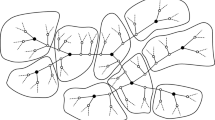Abstract
The problem of evaluating time complexity of random distributed algorithms is considered. A common and natural way to randomize a distributed algorithm is to use random walks i.e. memoryless stochastic processes: a “token” message circulates in the system and, at each step, the node that owns it sends it to one of its neighbors chosen at random. The token usually contains some pieces of information or part of the result of some distributed computing for instance. In this paper we focus on the cover time, defined by the expected time to visit all nodes in the system. This quantity often appears in the complexity of random walk based distributed algorithms. We provide a general method to compute the cover time on any arbitrary graph modeling a distributed system.
Preview
Unable to display preview. Download preview PDF.
Similar content being viewed by others
References
Bernard, T., Bui, A., Bui, M., Sohier, D.: A new method to automatically compute processing times for random walks based distributed algorithms. In: International Symposium on Parallel and Distributed Computing, pp. 31–37. IEEE Comp. Soc. Press, Los Alamitos (2003)
Bernard, T., Bui, A., Flauzac, O.: Topological adaptability for the distributed token circulation paradigm in faulty environment. In: Cao, J., Yang, L.T., Guo, M., Lau, F. (eds.) ISPA 2004. LNCS, vol. 3358, pp. 146–155. Springer, Heidelberg (2004)
Bui, M., Das, S.K., Datta, A.K., Nguyen, D.T.: Randomized mobile agent based routing in wireless networks. International Journal of Foundations of Computer Science 12(3), 365–384 (2001)
Chandra, K., Raghavan, P., Ruzzo, W.L., Smolensky, R.: The electrical resistance of a graph captures its commute and cover times, pp. 574–586 (1989)
Doyle, P. G., Laurie Snell, J.: Random Walks and Electric Networks (2000) (first edition 1984 Mathematical Association of America)
Israeli, A., Jalfon, M.: Token management schemes and random walks yield self-stabilizing mutual exclusion. In: 9th ACM symposium on Principles of distributed computing, pp. 119–131 (1990)
Lovász, L.: Random walks on graphs: A survey. In: Szönyied., T., Miklós, D., Sós, V.T. (eds.) Combinatorics: Paul Erdos is Eighty, vol. 2, pp. 353–398. János Bolyai Mathematical Society (1993)
Sohier, D., Bui, A.: Hitting times computation for theoretically studying peerto- peer distributed system. In: IPDPS 2004 - Sixth Workshop on Advances in Parallel and Distributed Computational Models - APDCM, IEEE Computer Society Press, Los Alamitos (2004)
Tetali, P.: Random walks and effective resistance of networks. J. Theoretical Probability (1991)
Tsoumakos, D., Roussopoulos, N.: A comparison of peer-to-peer search methods. In: Sixth International Workshop WebDB 2003 (2003)
Author information
Authors and Affiliations
Editor information
Editors and Affiliations
Rights and permissions
Copyright information
© 2005 Springer-Verlag Berlin Heidelberg
About this paper
Cite this paper
Bui, A., Sohier, D. (2005). On Time Analysis of Random Walk Based Token Circulation Algorithms. In: Ramos, F.F., Larios Rosillo, V., Unger, H. (eds) Advanced Distributed Systems. ISSADS 2005. Lecture Notes in Computer Science, vol 3563. Springer, Berlin, Heidelberg. https://doi.org/10.1007/11533962_7
Download citation
DOI: https://doi.org/10.1007/11533962_7
Publisher Name: Springer, Berlin, Heidelberg
Print ISBN: 978-3-540-28063-7
Online ISBN: 978-3-540-31674-9
eBook Packages: Computer ScienceComputer Science (R0)




